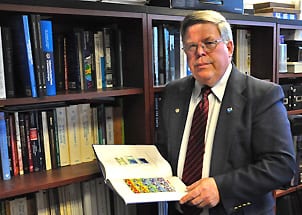By Daniel de la Calle
In a case of unprecedented coincidence, two of this year’s Heinz Awards winners are very closely related to A Sea Change and Ocean Acidification. Richard Feely, one of our favorite NOAA scientists, and Elizabeth Kolbert, the New Yorker journalist that wrote the article “The Darkening Sea” that inspired the film are each going to receive the Heinz Award Medallion and an unrestricted cash prize of $100,000.
The Heinz Awards website writes about Richard Feely:

Logging more than 1,000 days at sea on over 50 scientific expeditions, Dr. Richard Feely of Seattle, a senior research scientist at the National Oceanic and Atmospheric Administration’s (NOAA) Pacific Marine Laboratory, has played a leading role in examining the acidification of oceans and shifting public policy to address this growing issue.
In fact, ocean acidity is now considered global warming’s “evil twin,” thanks in large measure to Dr. Feely’s seminal research on the changing ocean chemistry and its impact on marine ecosystems. He argues that with the continuation of uncontrolled “greenhouse” gas emissions, the acidity of the world’s oceans will double by the end of the century.
Dr. Feely is sounding the alarm that our oceans are becoming more acidic earlier than expected, which has enormous impact on the environment. His groundbreaking research includes leading NOAA expeditions, such as one off North America’s Pacific coast, that discovered the startling fact that corrosive waters were at acidic levels not predicted by climate change models to occur for decades.
Richard Feely has spent his federal government career researching and understanding ocean chemistry and the effects of human-induced changes, particularly excess carbon dioxide, on the world’s seas. Early on, his findings were largely ignored. However, recognizing ocean acidity as an environmental problem with potentially catastrophic economic consequences, Dr. Feely persistently and methodically applied the highest levels of scientific inquiry as the problem grew in scope and intensity. He has also leveraged media platforms to explain the problem of ocean acidification and to increase its visibility more publicly. Dr. Feely maintains “The decisions we make now, over the next 50 years, will be felt over hundreds of thousands of years.”
And this is what it says about Elizabeth Kolbert:

A groundbreaking environmental journalist, Elizabeth Kolbert is devoted to educating the public about environmental issues and has gone far beyond traditional reporting – even raising a hive of bees in her backyard to better understand their habits and explain them to her readers for a story about their mysterious disappearance.
When Ms. Kolbert joined The New Yorker as a staff writer in 1999, she began to fully explore the field of environmentalism in general and the topic of global change in particular. Her fascination with the climate began in early 2000, when she felt the topic, which was mostly the province of scientists and environmentalists, was not getting enough clear coverage in the mass media.
Ms. Kolbert’s unique ability to communicate complex information generates intense public interest and grabs national attention. Her passion and creativity shine through her writing. Ms. Kolbert has an ability to describe complicated scientific processes in entertaining and educating ways as she spreads the critical story of our changing planet.
In a style that is both instructional and chatty, Ms. Kolbert walks readers who are largely not scientists or climate experts, through the multiple disciplines studying this issue. She is an award-winning journalist who brings her natural curiosity and intelligence to bear on the growing concerns raised by our warming planet. By dissecting and disseminating the vast and highly technical scientific information available on global climate change, she brings these crucial issues to a wider audience.
She has become a trusted resource to a growing network of concerned citizens who crave informed expertise on the topic but who lack the access she has acquired to the many disciplines researching the topic.
We are so happy for them both, it is well deserved recognition for a life guided by talent and hard work. And they are probably very happy as well that they do not live in Spain, because back in my country this sort of news spreads like wildfire and they would now be forced to invite to drinks and tapas anyone they ever met.


